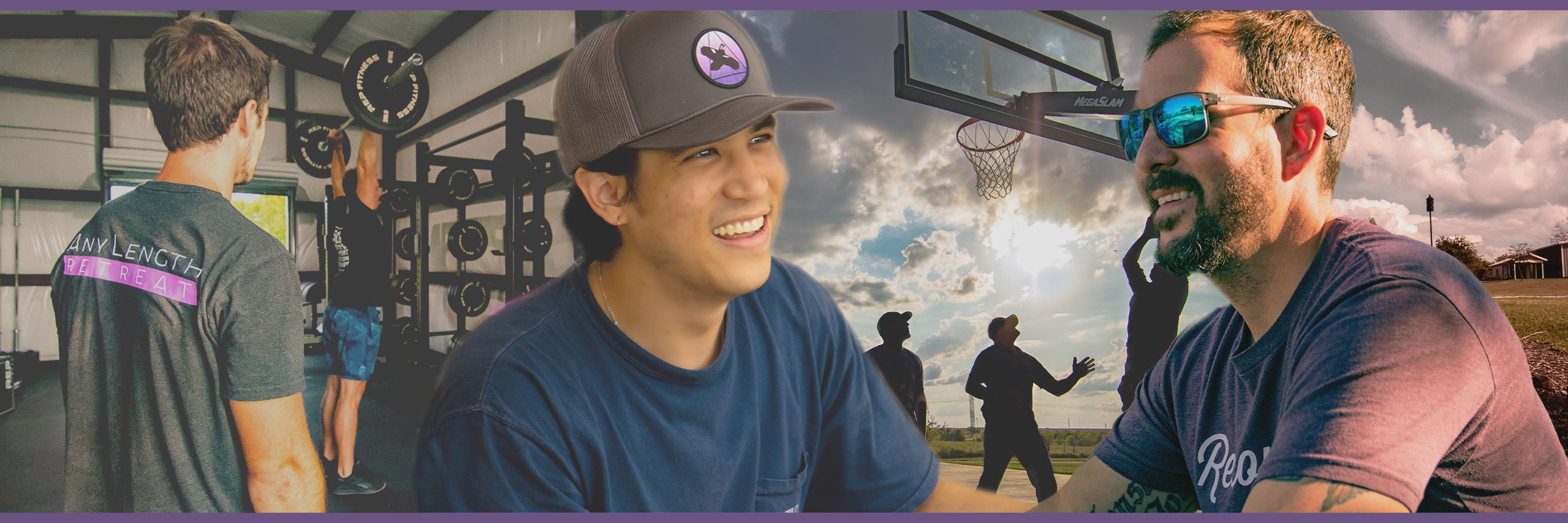
Lifelong Recovery Starts Here
A personal approach to supportive, community-based addiction rehabilitation services that make lifelong recovery possible.
Drug Addiction Recovery Program For Men
Any Length doesn’t take a typical approach to addiction services for men who are in various stages of recovery and committed to maintaining sobriety long term. We’re an alternative that can provide support for those who have never sought help for an addiction as well as those who haven’t gotten the results they want from more traditional forms of addiction treatment.
Our retreats are designed to not only take you out of the environment that could lead to relapse but to also help participants tap into something deeper. To really connect with themselves so that they can understand their addiction and how to manage it. Retreat participants are given the space, peace and time that’s needed to fully heal so they can move forward in life with a stronger foundation and the support they need to succeed.
Any Length Retreat Men’s Addiction Services
Retreat-Style Recovery Programs in Austin, TX
Helping men and their families find lifelong freedom from substance abuse since 2016.
Addiction recovery is a journey, and we can’t walk the path alone. Our men’s sobriety retreat is here to guide and support your loved one every step along the way. At Any Length Retreat, we believe drug and alcohol rehab requires healing the whole person: body, mind, and spirit. The wellness and recovery programs address all facets of health so that participants leave feeling better than they have in years.
Get started on your journey to recovery with help from Any Length Retreat.
GET SUBSTANCE ABUSE HELP FOR A LOVED ONE
GET SUBSTANCE ABUSE HELP FOR MYSELF
I’M AN ADDICTION SPECIALIST

Recover Life
There are many options to consider when choosing men’s drug and alcohol addiction services for yourself or a loved one. Our approach is a unique alternative to traditional men’s drug addiction treatment centers. One distinction is all of our staff members have recovered from addiction. Men that come to Any Length Retreat have been able to achieve sustainable recovery and live a life filled with freedom and happiness. So much so, some now help other men achieve the same lasting recovery.
Recover Family
At Any Length Retreat, our Retreat Mentors work diligently with our guests and their loved ones to rebuild vital components within their interpersonal relationships, such as trust, compassion, love, and respect. Sustainable recovery depends upon healing past trauma, addressing mental illness, positive communication skills, and stopping codependency.


Recover Purpose
Many men’s addiction treatment centers only offer 30-day long residential programs. Since 2016, the average length of stay at Any Length Retreat has been 60 days. Our founder, Robert White, leads a goals group with the guests weekly so they can look forward to their future and come up with a purposeful plan of action during the months at Any Length Retreat.
After completing our men’s recovery program, many of our guests have gone on to become business owners, home owners, and world travelers. They can do it, and you can too!
Our Retreat Practices & Approaches
- Authentic Love-Based Approach
- Home Atmosphere
- Exist in the Present Moment
- Unique Tailored Experience
- More than One Staff Member for every Two Guests’
- Adequate Representation of True Recovery
- Achieve Peak Physical Performance
- Highest Rated Men’s Drug Addiction Recovery Retreat in Texas
- Yoga & Meditation
- Goal-setting
The Purpose of Our Alcohol and Drug Rehab Retreats
The 12 Steps: Because they work
Rather than simply addressing the symptoms of addiction, such as triggers or cravings, Any Length Retreat believes in healing the whole person – mind, body, and spirit. The 12 Step Facilitation is one of the oldest and most successful forms of drug addiction recovery that has the same focus.
It was originally conceived by Alcoholics Anonymous for healing alcohol abuse, but the 12 Steps is now hailed as the standard at any men’s addiction recovery center for all types of substance use disorders. Designed to initiate fundamental change and spiritual renewal, the 12 Steps have been shown to produce lasting results for the better part of a century.

Bridging the gap between men’s addiction treatment and sober living

Men’s Addiction Treatment Focused on Lifelong Success

Relapse Doesn’t HAVE to be Part of Your Story
What People Say
I enjoyed every aspect of my stay at ALR. The staff is very focused on teaching – not preaching – the 12&12. The staff is friendly and always attentive to your needs as you go through difficult times. The house and the grounds are very homey and comfortable. I would recommend ALR to anyone who needs to get help for any addiction issues. It was a pleasure and a great learning experience. I feel very confident and free of self after my stay at ALR to stay sober and work with other addicts.
Luke F.
This place gave me my life back. It showed me what I can be and what I needed to do to be that person. The sense of brotherly love is amazing. It has the perfect balance of work and play and does wonders for your mind, body, and spirit! The staff truly cares about you and wants to see you get better. It gave me all the tools that I needed to achieve long-term recovery. I couldn’t have asked for a better treatment center!
Kent B.
I came in a broken state mentally, emotionally, and physically. The experience I have had at the retreat is something I never thought it was going to be between the staff and the community. I was able to really work on myself more than I ever thought was possible. I’m so grateful for this place. I have no regrets in coming here.
Chad H.
Our Blog
- Get substance abuse rehab in Austin for menTop Questions About Men’s Substance Abuse Rehab in Austin Making the choice to get men’s addiction treatment in Austin is the first step in recovery. But some people feel a … Read More
- What Are the Differences in Opioid Types?Opioids are a classification of drugs that can be naturally occurring from poppy plants or synthetic (manmade). These types of drugs are primarily used to relieve pain. They are very … Read More
- What Type of Opioid is HeroinOpioids are a class of drugs that bind to opioid receptors in the brain and body, often reducing pain and providing a sense of euphoria. Opioid receptors serve a number … Read More
Our comprehensive, holistic men’s recovery retreat is NOT A LICENSED TREATMENT CENTER. Our spiritual retreat is centered on the principles of the 12 Steps and led by caring mentors who have recovered from addiction. They provide guidance in both individual and group settings.
Any Length Retreat recovery and wellness programs are designed to help your loved one find a new way of life that isn’t controlled by alcohol or drug abuse. Read our full disclaimer, or you can contact us to learn more about Any Length Retreat recovery programs and the addiction services that are provided.
Highest Rated Men’s Drug Addiction Recovery Program in Austin, TX







